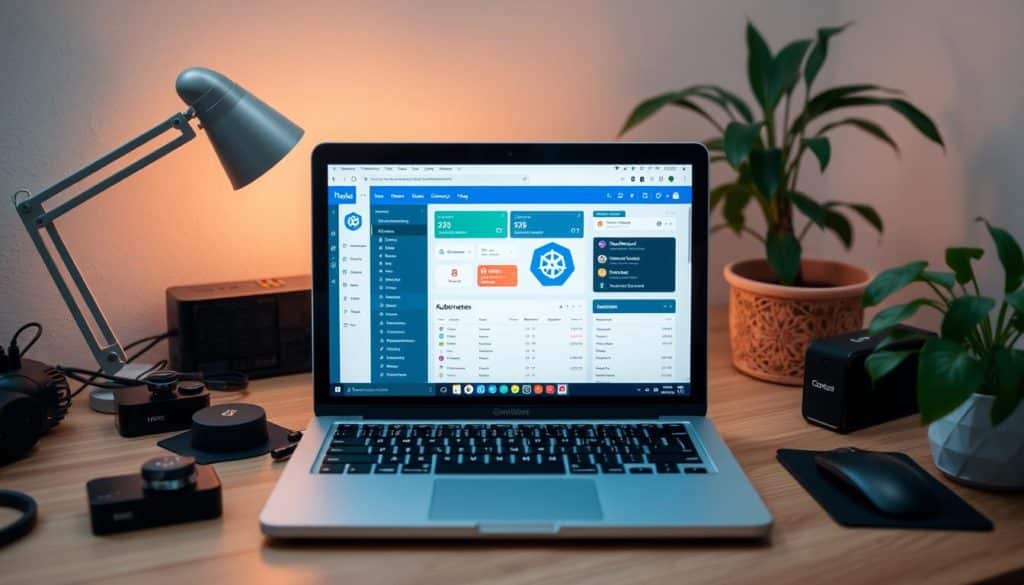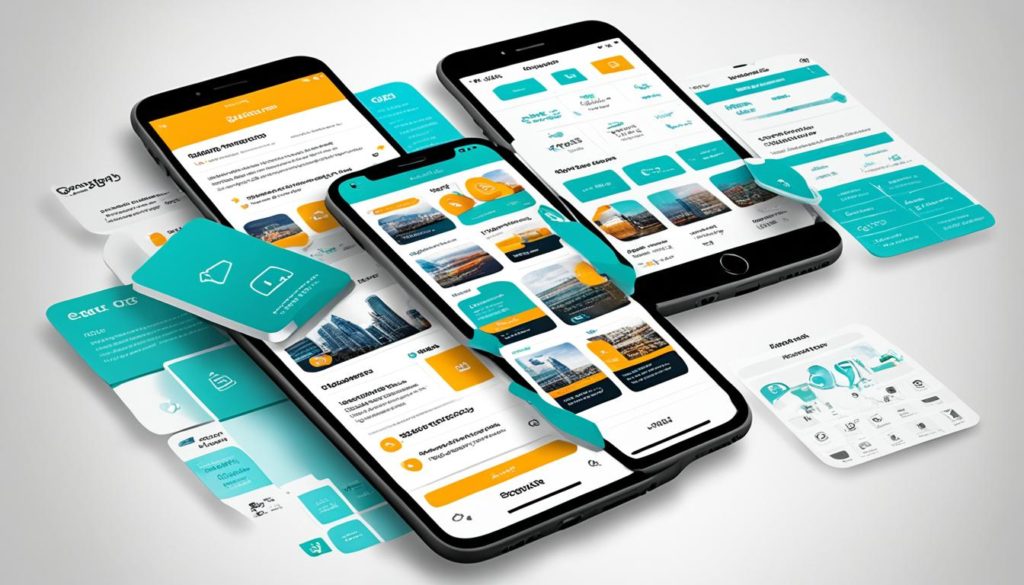
Did you know that 48% of users think a company’s online presence is key to its trustworthiness? This fact shows how vital it is to know the differences between web app and website. In the early web days, sites were simple and static. But now, the web has changed a lot, blending features that used to be separate.
A website is like a collection of pages that share information or provide static content. On the other hand, a web app is more interactive, letting users do specific tasks. For businesses, understanding these differences is key. Having a strong online presence can really help your brand succeed. We provide custom solutions to fit your business needs, helping you pick the right option for your goals.
Key Takeaways
- Websites deliver information and typically consist of static content.
- Web apps offer dynamic interaction, allowing users to execute specific tasks.
- Understanding the differences between web app and website is essential for strategic web development.
- Enhanced online presence boosts business credibility.
- Custom solutions from companies like Wesrom cater to unique business needs and goals.
Understanding the Basics
Having a strong online presence is key. It’s important to know the basics of website design and web-based applications. Let’s explore the main ideas and see how websites and web apps differ.
What is a Website?
A website is a collection of web pages under one domain. It shares information with users. Websites usually have static content that users can read without interacting with the backend. The design aims to make it easy to navigate and find what you need.
- Informational content
- Predominantly static
- Main focus on readability and navigation
What is a Web App?
A web app is different from a website. It’s a dynamic software application that you can access through a web browser. Web apps often talk to a backend database, making them interactive and personalized. They can handle complex tasks and give users real-time data and responses.
- Interactive and dynamic
- Backend database interactions
- Personalized user experience
| Feature | Website | Web App |
|---|---|---|
| Content Type | Mostly Static | Dynamic |
| User Interaction | Low | High |
| Complexity | Simpler | More complex |
Features and Functionality
When looking at websites and web applications, it’s key to know the difference between static and dynamic content. Static content stays the same for everyone who visits a site. Web applications, however, change their content based on what users do and say. This makes the experience more personal and engaging.
Static vs Dynamic Content
Websites and web applications have different types of content. Static content doesn’t change once it’s put online. It’s great for pages that don’t need much updating, like company info or blogs. This kind of content is easy to manage and quick to update.
On the other hand, dynamic content is what makes web applications special. It changes in real-time based on what users do. For example, it can show personalized product suggestions on an online store or update social media feeds. Using dynamic content makes the experience more personal and relevant.
Interaction and User Input
Websites usually don’t ask for much from users, focusing on sharing information. Users can read articles, look at pictures, or find company details. This is because websites are mainly about showing static content.
Web applications, however, need a lot of user input and interaction. Users can fill out forms, upload files, or make purchases. This makes web apps great for tasks that need quick feedback and action. It also makes the experience more interactive.
Web apps are more dynamic, which makes the experience better but also requires more security and support.
Knowing the differences can help you decide if you need a simple website or a complex web application. Think about how much interaction you want and the kind of content you’ll share. This way, you can create an online space that meets your goals.
Here’s a quick comparison to illustrate these points:
| Aspect | Website | Web Application |
|---|---|---|
| Content Type | Static | Dynamic |
| User Interaction | Limited | High |
| Development Complexity | Lower | Higher |
| Maintenance | Simple | Complex |
| Scalability | Limited | High |
Web App vs Website: Key Differences
Web applications and websites have clear differences in how they are made, maintained, and used. These differences shape their unique roles and affect business choices on which to use.
Development Complexity
Web app development complexity stands out because it needs a detailed plan. Unlike simple websites, web apps offer dynamic interactions. This means they need more complex designs and strong security.
For example, a banking web app must have a secure backend to handle transactions safely. In contrast, a website about banking just shares information. This makes web app development more challenging and requires skilled software developers. Learn more about web app development here.
Cost and Maintenance
Looking at the website maintenance cost, it’s usually lower than for web apps. Websites need updates and small design changes now and then. But web apps, being more interactive, need constant updates to stay current with user needs and tech changes.
This ongoing upkeep keeps them running well and securely. But it also means a bigger investment over time.
User Experience
The design of the user interface is crucial for both websites and web apps. Websites focus on looking good and being easy to navigate. Web apps, however, must be functional and interactive.
The user interface design of a web app should be easy to use, smooth, and quick to respond. Regular updates are needed to meet user needs and tastes. This highlights the value of skilled developers and designers.
In summary, knowing the differences in web app development complexity, website maintenance cost, and user interface design helps in making smart choices about web technology. For more details, check out Essential Designs for insights and examples.
Choosing the Right One for Your Business
Deciding between a website and a web app is key for your business. Let’s look at when each might be the better choice for your branding and online services.
Scenarios for Websites
Websites work great for businesses that want to share info, promote their brand, and have a wide online presence. They’re perfect if you aim to build trust, show off products, and share important details without needing a lot of user interaction. A website helps your brand look professional and trustworthy, making it easier for clients to find and believe in your services.
- Content Marketing: Blogs, news updates, and articles can be easily managed.
- Portfolios: Displaying past works, client testimonials, and experience.
- Business Information: Contact details, service descriptions, and location.
Scenarios for Web Apps
Web apps are best for businesses that need to offer interactive, personalized experiences. If your business involves a lot of user interaction, like online services, customized experiences, or interactive tools, a web app is the way to go. This choice lets your platform handle complex tasks, making users more involved and satisfied.
- E-Commerce Platforms: Handling transactions and personalized shopping experiences.
- Customer Portals: Allowing users to log in, manage, and track services.
- Interactive Tools: Providing calculators, forms, and other dynamic functionalities.
Here’s a quick comparison to help you decide:
| Feature | Website | Web App |
|---|---|---|
| User Interaction | Low | High |
| Content Management | Static | Dynamic |
| Development Complexity | Lower | Higher |
| Maintenance | Moderate | Intensive |
Conclusion
When choosing between websites and web applications, it depends on your digital business strategy. Websites are key for showing your online identity, sharing important info, and improving SEO. They help you share content that shows off your brand and values.
Web applications, on the other hand, are great for being interactive and handling complex tasks. They can process user input and manage business operations well. These apps are perfect for businesses that want to engage users more and make things easier.
Choosing between a website and a web app should be based on your goals, what your market needs, and what tech you have. Making the right choice means picking a platform that boosts your visibility and makes things work better. Whether you want to share info or offer interactive services, picking the right option can greatly help your digital business grow and succeed online.
FAQ
What is the key difference between a website and a web app?
Websites are like online brochures that don’t change much. Web apps, on the other hand, are interactive tools that let users do things online.
Can a web app also serve informational purposes like a website?
Yes, web apps can share information. But they do it in a way that’s more fun and personal for the user.
What kind of content does a static website display?
Static websites show the same info to everyone. They don’t change much and are mainly for sharing information.
How do dynamic websites and web apps enhance user experience?
Dynamic sites and web apps use databases and user input to make content and services more personal. This makes the experience more engaging.
Are web apps more complex to develop than websites?
Yes, making web apps is harder because they need to work interactively and have complex backend processes. This makes them tougher to build and keep up.
What does it cost more to maintain: a website or a web app?
Keeping a web app running costs more. This is because it needs regular updates, security checks, and improvements to keep users happy.
Under what business scenarios would a traditional website be more suitable?
Traditional websites work best for sharing info and branding. They’re great for showing off products and building an online identity.
When should a business opt for a web app over a website?
Choose a web app if you want to offer interactive services and give users a personalized experience. It’s good for engaging with users based on their actions.
How do web apps impact user engagement compared to websites?
Web apps boost user engagement with interactive features and content that changes based on user actions. Websites are usually more static and less engaging.
What factors should be considered when choosing between a website and a web app?
Think about how much interaction you want, the complexity of the functions, your business goals, and your budget for making and keeping it up.
Future App Studios is an award-winning software development & outsourcing company. Our team of experts is ready to craft the solution your company needs.










